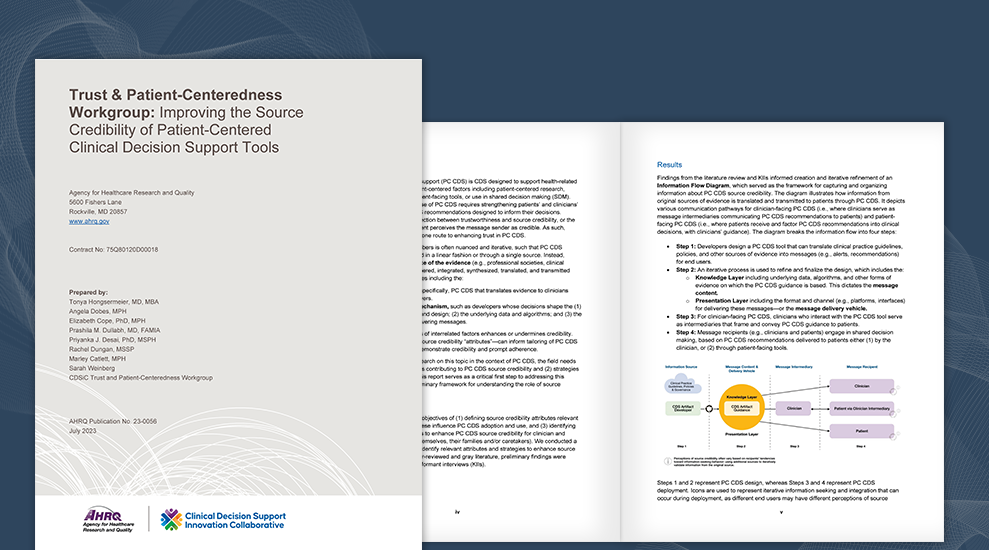
This report provides a framework for understanding the role of source credibility in patient-centered clinical decision support tools.
Developed by the AHRQ CDSiC Trust and Patient-Centeredness Workgroup, this report provides a framework for CDS tool developers to better understand the factors that contribute to credibility in patient-centered clinical decision support as well as strategies for improving it.
Ensuring successful uptake and use of patient-centered clinical decision support (PC CDS) requires strengthening patients’ and clinicians’ trust in each other and in PC CDS recommendations designed to inform their decisions. Literature suggests a strong connection between trustworthiness and source credibility, or the degree to which a message recipient perceives the message sender as credible. As such, improving source credibility offers one route to enhancing trust in PC CDS. Due to the emerging nature of research on this topic in the context of PC CDS, the field needs to further explore (1) factors contributing to PC CDS source credibility and (2) strategies for improving source credibility. This report serves as a critical first step to address this evidence gap by providing a preliminary framework for understanding the role of source credibility in PC CDS.
About the Report
This report is based on a scoping review of peer-reviewed and grey literature to identify relevant attributes and strategies to enhance source credibility. Key informant interviews also informed the development of an information flow diagram, which illustrates how information from original sources of evidence is translated and transmitted to patients through PC CDS. The report presents and describes the relevance of attributes salient for PC CDS and thus most likely to impact source credibility, including:
- Accuracy
- Consistency
- Objectivity
- Reliability
- Currency
- Relevance
- Transparency
- Competence
- Usability
- Expertise
The report also includes end-user perception-based source credibility attributes capturing how end users assign credibility to a PC CDS tool based on a combination of personal factors. These attributes include:
- Authority/Authoritativeness
- Relatability
- Appeal
- Openness and Receptivity
How to Use this Report
Those designing and deploying PC CDS can use this report to employ strategies for improving source credibility by modifying attributes of PC CDS and by modifying perception-based attributes.
Strategies to modify PC CDS attributes include:
- Engaging clinicians and patients in PC CDS co-design and co-development.
- Communicating key information regarding PC CDS construction and creation.
- Designing CDS tools and systems that run on up-to-date information and signal the timeliness of embedded knowledge.
Strategies to modify perception-based attributes include:
- Tailoring PC CDS messages and delivery mechanisms.
- Creating feedback loops to solicit end-user feedback and iteratively inform PC CDS deployment.
The report outlines the priority research topics that can address evidence gaps and advance PC CDS source credibility related to attributes, strategies, and end-user factors.
Suggested Citation: Hongsermeier T, Dobes A, Cope E, Dullabh PM, Desai PJ, Dungan R, Catlett M, Weinberg S, and the Trust and Patient-Centeredness Workgroup: Improving the Source Credibility of Patient-Centered Clinical Decision Support Tools. Prepared under Contract No. 75Q80120D00018. AHRQ Publication No. 23-0056. Rockville, MD: Agency for Healthcare Research and Quality; July 2023.





